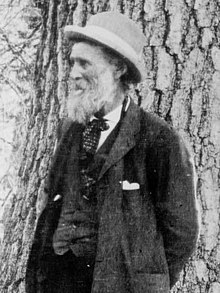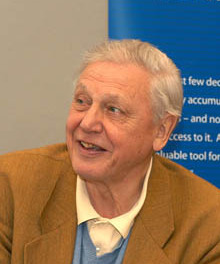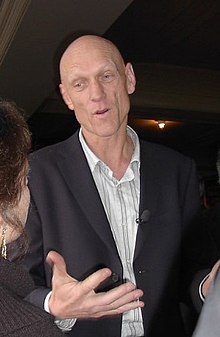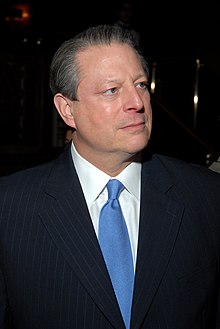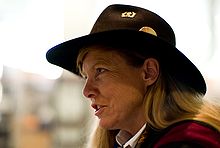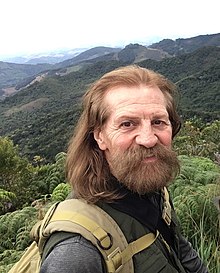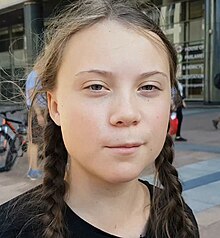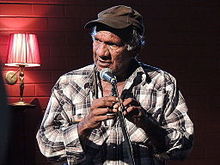An environmentalist is a person who is concerned with and/or advocates for the protection of the environment. An environmentalist can be considered a supporter of the goals of the environmental movement, "a political and ethical movement that seeks to improve and protect the quality of the natural environment through changes to environmentally harmful human activities". An environmentalist is engaged in or believes in the philosophy of environmentalism or one of the related philosophies.
The environmental movement has a number of subcommunities, with different approaches and focuses – each developing distinct movements and identities. Critics of environmentalists sometimes referred to using informal or derogatory terms such as "greenie" and "tree-hugger", with some members of the public disassociating the most radical environmentalists with these derogatory terms.
Types
The environmental movement contains a number of subcommunities, that have developed with different approaches and philosophies in different parts of the world. Notably, the early environmental movement experienced a deep tension between the philosophies of conservation and broader environmental protection. In recent decades the rise to prominence of environmental justice, indigenous rights and key environmental crises like the climate crises, has led to the development of other environmentalist identities. Environmentalists can be describe as one of the following:
Climate activists
The public recognition of the climate crisis and emergence of the climate movement in the beginning of the 21st century led to a distinct group of activists. Activations like the School Strike for Climate and Fridays for Future, have led to a new generation of youth activists like Greta Thunberg, Jamie Margolin and Vanessa Nakate who have created a global youth climate movement.
Conservationists
One notable strain of environmentalism, comes from the philosophy of the conservation movement. Conservationists are concerned with leaving the environment in a better state than the condition they found it distinct from human interaction. The conservation movement is associated with the early parts of the environmental movement of the 19th and 20th century.
Environmental defenders
Environmental defenders or environmental human rights defenders are individuals or collectives who protect the environment from harms resulting from resource extraction, hazardous waste disposal, infrastructure projects, land appropriation, or other dangers. In 2019, the UN Human Rights Council unanimously recognised their importance to environmental protection. The term environmental defender is broadly applied to a diverse range of environmental groups and leaders from different cultures that all employ different tactics and hold different agendas. Use of the term is contested, as it homogenises such a wide range of groups and campaigns, many of whom do not self-identify with the term and may not have explicit aims to protect the environment (being motivated primarily by social justice concerns).
Environmental defenders involved in environmental conflicts face a wide range of threats from governments, local elites, and other powers that benefit from projects that defenders oppose. Global Witness reported 1,922 murders of environmental defenders in 57 countries between 2002 and 2019, with indigenous people accounting for approximately one third of this total. Documentation of this violence is also incomplete. The UN Special Rapporteur on human rights reported that as many as one hundred environmental defenders are intimidated, arrested or otherwise harassed for every one that is killed.Greens
The adoption of environmentalist into a distinct political ideology led to the development of political parties called "green parties", typically with a leftist political approach to overlapping issues of environmental and social wellbeing.
Water protectors
Water protectors are activists, organizers, and cultural workers focused on the defense of the world's water and water systems. The water protector name, analysis and style of activism arose from Indigenous communities in North America during the Dakota Access Pipeline protests at the Standing Rock Indian Reservation, which began with an encampment on LaDonna Brave Bull Allard's land in April, 2016.
Water protectors are similar to land defenders, but are distinguished from other environmental activists by this philosophy and approach that is rooted in an indigenous cultural perspective that sees water and the land as sacred. This relationship with water moves beyond simply having access to clean drinking water, and comes from the beliefs that water is necessary for life and that water is a relative and therefore it must be treated with respect. As such, the reasons for protection of water are older, more holistic, and integrated into a larger cultural and spiritual whole than in most modern forms of environmental activism, which may be more based in seeing water and other extractive resources as commodities.
Historically, water protectors have been led by or composed of women, because as water provides life, so do women.Notable environmentalists
Some of the notable environmentalists who have been active in lobbying for environmental protection and conservation include:
- Edward Abbey (writer, activist, philosopher)
- Ansel Adams (photographer, writer, activist)
- Bayarjargal Agvaantseren (Mongolian conservationist)
- Qazi Kholiquzzaman Ahmad (environmental activist and economist of Bangladesh)
- David Attenborough (broadcaster, naturalist)
- John James Audubon (naturalist)
- Sundarlal Bahuguna (environmentalist)
- Seyyed Hossein Nasr (writer, philosopher)
- Patriarch Bartholomew I (priest)
- David Bellamy (botanist)
- Ng Cho-nam (Hong Kong environmentalist and Associate Professor of Geography at University of Hong Kong)
- Thomas Berry (priest, historian, philosopher)
- Wendell Berry (farmer, philosopher)
- Chandi Prasad Bhatt (Gandhian environmentalist)
- Murray Bookchin (anarchist, philosopher, social ecologist)
- Wendy Bowman, Australian environmental activist
- Stewart Brand (writer, founder of Whole Earth Catalog)
- David Brower (writer, activist)
- Molly Burhans (cartographer, activist)
- Tahir Qureshi Mangrove Man or Mangroves Hero of Pakistan. Pakistani environmentalist.
- Lester Brown (environmentalist)
- Kevin Buzzacott (Aboriginal activist)
- Michelle Dilhara (actress)
- Helen Caldicott (medical doctor)
- Joan Carling (Filipino human rights defender)
- Rachel Carson (biologist, writer)
- Charles, Prince of Wales
- Chevy Chase (comedian)
- Barry Commoner (biologist, politician)
- Mike Cooley (engineer, trade unionist)
- Jacques-Yves Cousteau (explorer, ecologist)
- Faiza Darkhani (c. 1992), Afghani environmentalist, women's rights activist, and educator
- Leonardo DiCaprio (actor)
- René Dubos (microbiologist)
- Paul R. Ehrlich (population biologist)
- Hans-Josef Fell (German Green Party member)
- Jane Fonda (actor)
- Rolf Gardiner (rural revivalist)
- Peter Garrett (musician, politician)
- Al Gore (politician, former Vice President of the United States)
- Tom Hanks (actor)
- James Hansen (scientist)
- Denis Hayes (environmentalist and solar power advocate)
- Nicolas Hulot (journalist and writer)
- Robert Hunter (journalist, co-founder and first president of Greenpeace)
- Tetsunari Iida (sustainable energy advocate)
- Jorian Jenks (English farmer)
- Naomi Klein (writer, activist)
- Winona LaDuke (environmentalist)
- A. Carl Leopold (plant physiologist)
- Aldo Leopold (ecologist)
- Charles Lindbergh (aviator)
- James Lovelock (scientist)
- Amory Lovins (energy policy analyst)
- Hunter Lovins (environmentalist)
- Mark Lynas (journalist, activist)
- Desmond Majekodunmi (environmentalist)
- Xiuhtezcatl Martinez (activist)
- Peter Max (graphic designer)
- Michael McCarthy (naturalist, newspaper journalist, newspaper columnist, and author)
- Bill McKibben (writer, activist)
- David McTaggart (activist)
- Mahesh Chandra Mehta (lawyer, environmentalist)
- Chico Mendes (activist)
- George Monbiot (journalist)
- Sergio Rossetti Morosini (naturalist, activist)
- John Muir (naturalist, activist)
- Luke Mullen (actor, filmmaker, environmentalist/activist)
- Hilda Murrell (botanist, activist)
- Ralph Nader (activist)
- Gaylord Nelson (politician)
- Yolanda Ortiz (chemist), Argentine environmentalist
- Eugene Pandala (architect, environmentalist, natural and cultural heritage conservator)
- Medha Patkar (activist)
- Alan Pears (environmental consultant and energy efficiency pioneer)
- River Phoenix (actor, musician, activist)
- Jonathon Porritt (politician)
- Phil Radford (environmental, clean energy and democracy advocate, Greenpeace Executive Director)
- Bonnie Raitt (musician)
- Theodore Roosevelt (former President of the United States)
- Hakob Sanasaryan (biochemist, activist)
- Ken Saro-Wiwa (writer, television producer, activist)
- Shimon Schwarzschild (writer, activist)
- Vandana Shiva (environmental activist)
- Swami Sundaranand (yogi, photographer, author and mountaineer)
- David Suzuki (scientist, broadcaster)
- Candice Swanepoel (model)
- Shōzō Tanaka (politician and activist)
- Saalumarada Thimmakka
- Henry David Thoreau (writer, philosopher)
- Greta Thunberg (activist)
- Jo Valentine (politician and activist)
- Harvey Wasserman (journalist, activist)
- Paul Watson (activist and lecturer)
- Franz Weber (environmentalist and animal welfare activist)
- Henry Williamson (naturalist, writer)
- Wangari Maathai (Kenyan environmentalist, Nobel Laureate)
- Vanessa Nakate (Ugandan youth climate justice activist, UN SDG 13 Young Leader)
- Nyombi Morris (Ugandan youth environmental activist, CNN Environmentalist of tomorrow)
- Wangaari Maathai receives the first Nobel Peace Prize awarded for environmental protection (2004) for decades of work with the Green Belt Movement
Extension
In recent years, there are not only environmentalists for natural environment but also environmentalists for human environment. For instance, the activists who call for "mental green space" by getting rid of disadvantages of internet, cable TV, and smartphones have been called "info-environmentalists".

